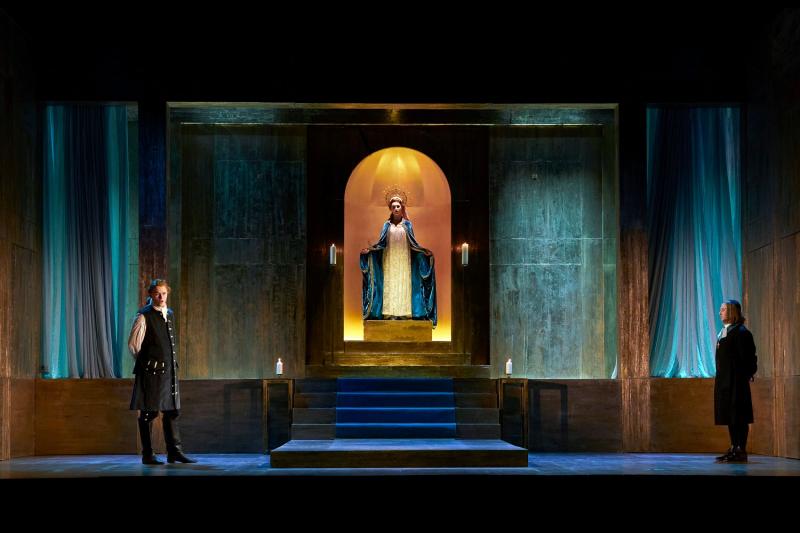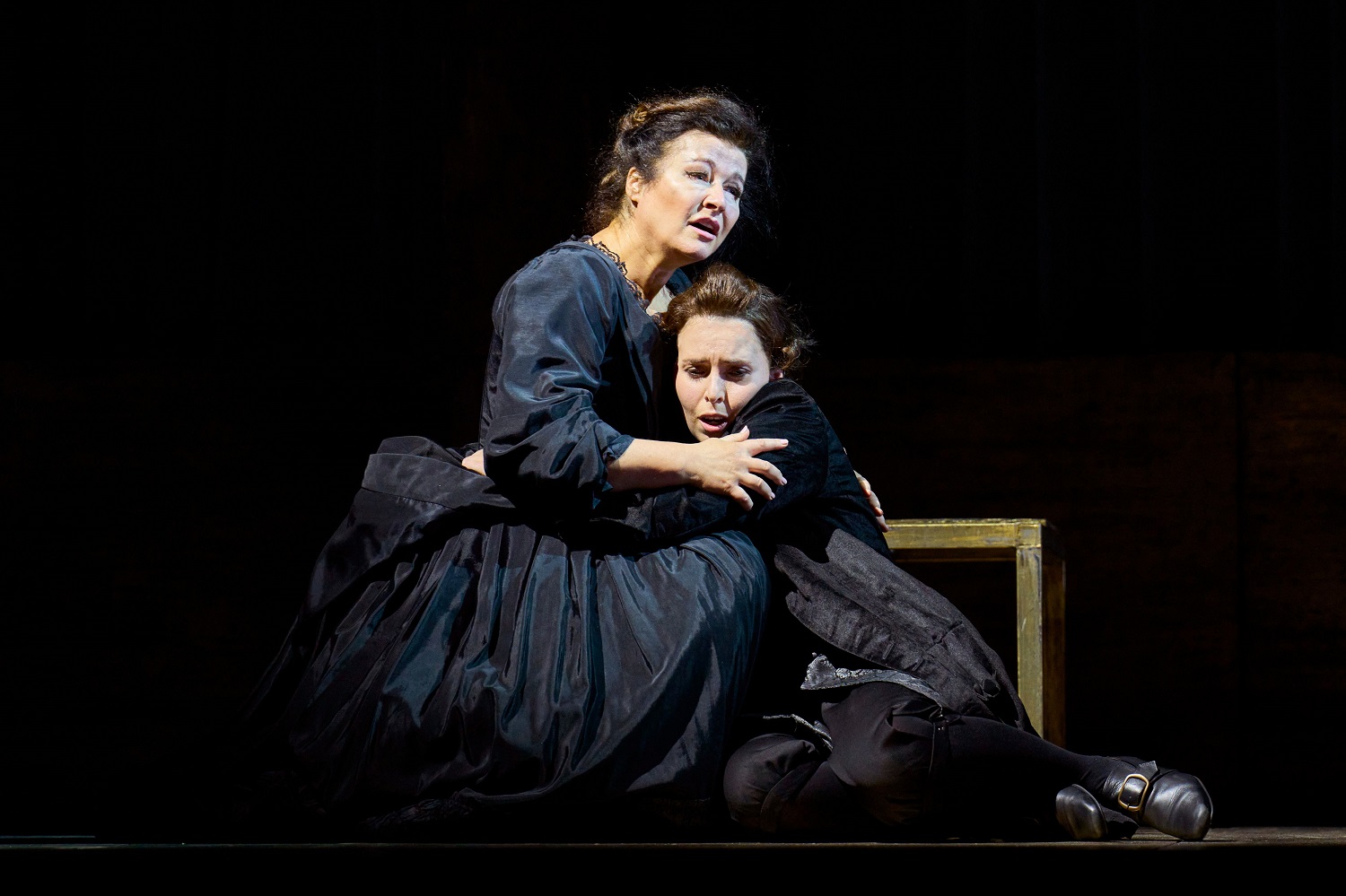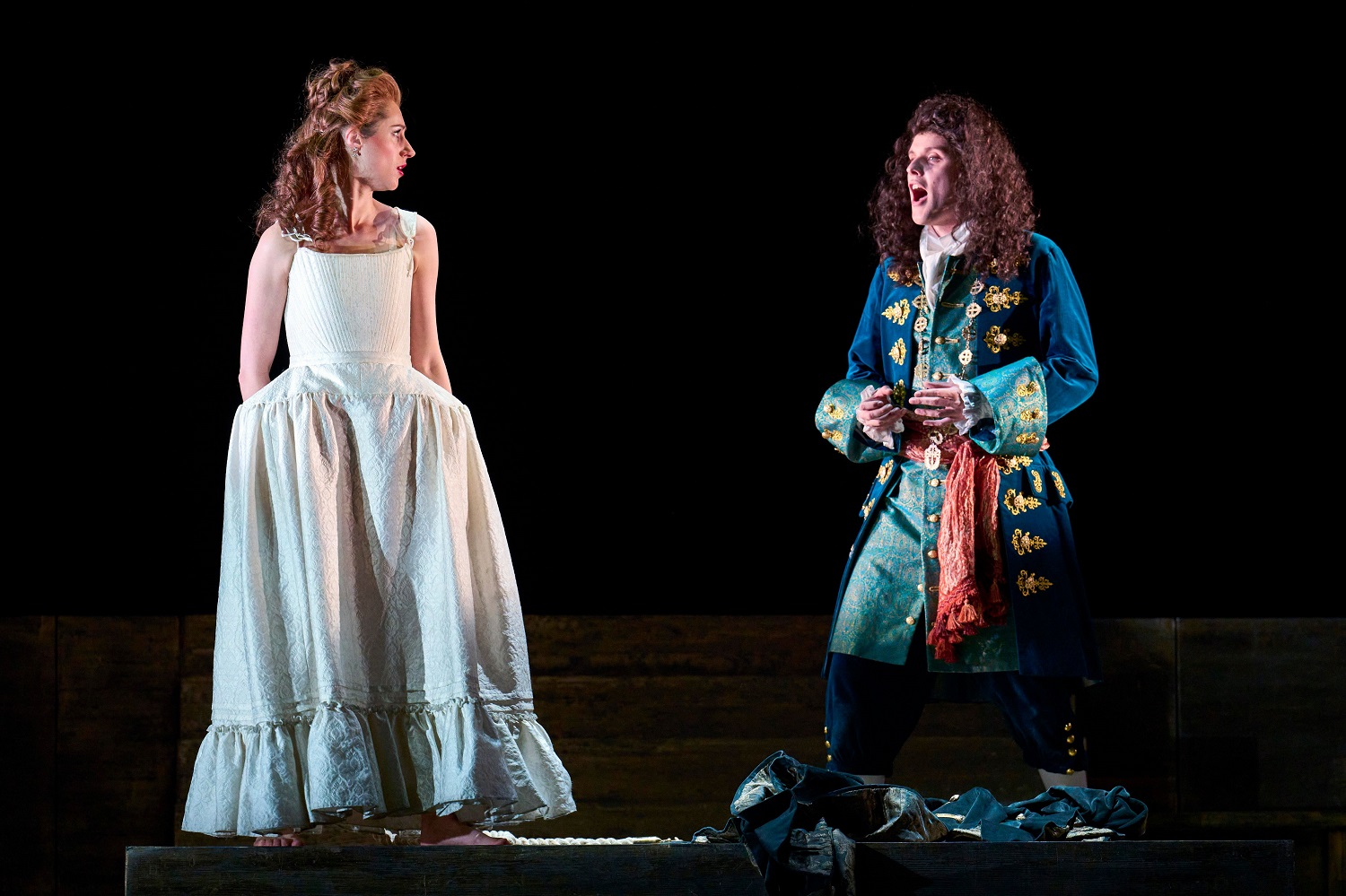Giulio Cesare, English Touring Opera review - a return visit to Handel's Egypt | reviews, news & interviews
Giulio Cesare, English Touring Opera review - a return visit to Handel's Egypt
Giulio Cesare, English Touring Opera review - a return visit to Handel's Egypt
Cleopatra shines in an otherwise only serviceable revival

English Touring Opera opened its spring season with Handel's Giulio Cesare – not a new production, but in a new guise. Typically for Baroque opera, the version of the work premiered in 1724 was very long. ETO previously took up the challenge by staging it in full over two nights. They then cut it down to a more manageable three hours (including interval), but that tour was interrupted by Covid, so now it's back for a full run.
Most of Handel's recitative is gone (thankfully), and the distribution of arias among the lead roles seems a little arbitrary, but a good sense of pace is retained. For the chorus, the company is engaging local choirs at each of its venues, here the Hackney Empire Community Choir. In an impressive coup de théâtre, the choir formed part of the audience, sitting at the ends of the balcony. But it proved to be a token gesture, as they only sang in two short passages, which could easily have been omitted.
As the opera opens, Caesar (Francis Gush) has defeated Pompey, whom he has pursued to Egypt. There, Cleopatra (Susanna Hurrell) and her brother Tolomeo (Alexander Chance) are locked in a war of succession. Tolomeo murders Pompey, and sends Caesar his head, in an unsuccessful effort to garner his support. A plot strand develops with Tolomeo and his ally Achilla (Edward Hawkins) vying for the hand of Pompey’s widow, Cornelia (Carolyn Dobbin), and another with Pompey’s son, Sesto (Margo Arsace, pictured below, right with Carolyn Dobbin) seeking revenge on both of them. Meanwhile, Cleopatra seduces Ceasar, initially disguised as a commoner, Lydia (librettist Nicola Francesco Haym doesn’t make much of this artifice, nor do the costumes here). The final act opens with the announcement that Caesar has died in a sea battle, which Tolomeo takes as a sign of his ascendency, and he imprisons Cleopatra. But it is fake news – Caesar swam to shore and survived, and the story wraps up with him rescuing Cleopatra and the death of all her foes.
Meanwhile, Cleopatra seduces Ceasar, initially disguised as a commoner, Lydia (librettist Nicola Francesco Haym doesn’t make much of this artifice, nor do the costumes here). The final act opens with the announcement that Caesar has died in a sea battle, which Tolomeo takes as a sign of his ascendency, and he imprisons Cleopatra. But it is fake news – Caesar swam to shore and survived, and the story wraps up with him rescuing Cleopatra and the death of all her foes.
Director James Conway and designer Cordelia Chisholm take a non-committal approach to the Egyptian setting. The set is made up three tall walls in a muted patina gold. This proves an ideal medium for the lighting effects (designer Joe Kirk), though the changes are of mood rather than setting. Costumes suggest the London of Handel’s era, drab but coherent. Conway employs modest props, notably Pompey’s head, which is made of glass and is later shown to hold his ashes. In one climactic aria these are poured onto the stage and billow into the auditorium.
The cast is relatively small for Handel, but it requires careful casting for the three castrato roles. Clearly, the work was written as a vehicle for a virtuoso singer in the title role, which is filled with intricate runs and complex ornaments. Francis Gush tackles all this bravely. He can cope with the tessitura, and his tone is elegant. But the sheer complexity of the music, especially in the opening aria, sometimes proves too much. Fortunately, the role also includes much lyrical music, and there he excels.
The best singing in this cast is from Susanna Hurrell and Alexander Chance as the siblings Cleopatra and Tolomeo (pictured below). Hurrell has a bright, rich tone and nimble articulation – she’s the star of the show. Tolomeo is presented as camp and over the top, and Alexander Chance is able to present the role as a welcome helping of comedy in the otherwise dour setting. His countertenor has a slightly covered quality that sets him apart. So too does his heavy legato, no doubt played up for the role. The other roles are delivered serviceably, but without any standout performances. Carolyn Dobbin, as Cornelia, has a mature voice, well projected but lacking warmth. Margo Arsane has the unenviable task of presenting the only trouser role in the production, as Sesto. Her voice is young and agile, but she struggles to find her place in a production where all the other men are played by men. Edward Hawkins is soft-toned as Achilla, Tolomeo’s lecherous accomplice, a role that surely calls for a darker and more menacing bass.
The other roles are delivered serviceably, but without any standout performances. Carolyn Dobbin, as Cornelia, has a mature voice, well projected but lacking warmth. Margo Arsane has the unenviable task of presenting the only trouser role in the production, as Sesto. Her voice is young and agile, but she struggles to find her place in a production where all the other men are played by men. Edward Hawkins is soft-toned as Achilla, Tolomeo’s lecherous accomplice, a role that surely calls for a darker and more menacing bass.
Conductor Sergey Rybin sets off the Overture at a sprightly pace, which he maintains for Caesar’s first, punishingly complex aria. But much of the later music is slower and more sensitively phrased. The Old Street Band is a period instrument pickup orchestra, their string sound warm, their rhythms nimble, and their accompaniments discreet. One aria is accompanied by a florid horn obbligato, which proved challenging, but the many woodwind solos were more successful.
Over the next few months, ETO will be touring the country with this production, along with Donizetti’s Lucrezia Borgia and Rossini’s Il Viaggio a Reims. As is now customary, all three will be seen first at Hackney, where the company is always guaranteed a warm reception, playing, as here, to an enthusiastic capacity audience.
rating
Explore topics
Share this article
The future of Arts Journalism
You can stop theartsdesk.com closing!
We urgently need financing to survive. Our fundraising drive has thus far raised £49,000 but we need to reach £100,000 or we will be forced to close. Please contribute here: https://gofund.me/c3f6033d
And if you can forward this information to anyone who might assist, we’d be grateful.

Subscribe to theartsdesk.com
Thank you for continuing to read our work on theartsdesk.com. For unlimited access to every article in its entirety, including our archive of more than 15,000 pieces, we're asking for £5 per month or £40 per year. We feel it's a very good deal, and hope you do too.
To take a subscription now simply click here.
And if you're looking for that extra gift for a friend or family member, why not treat them to a theartsdesk.com gift subscription?
more Opera
 BBC Proms: The Marriage of Figaro, Glyndebourne Festival review - merriment and menace
Strong Proms transfer for a robust and affecting show
BBC Proms: The Marriage of Figaro, Glyndebourne Festival review - merriment and menace
Strong Proms transfer for a robust and affecting show
 Orpheus and Eurydice, Opera Queensland/SCO, Edinburgh International Festival 2025 review - dazzling, but distracting
Eye-popping acrobatics don’t always assist in Gluck’s quest for operatic truth
Orpheus and Eurydice, Opera Queensland/SCO, Edinburgh International Festival 2025 review - dazzling, but distracting
Eye-popping acrobatics don’t always assist in Gluck’s quest for operatic truth
 MARS, Irish National Opera review - silly space oddity with fun stretches
Cast, orchestra and production give Jennifer Walshe’s bold collage their all
MARS, Irish National Opera review - silly space oddity with fun stretches
Cast, orchestra and production give Jennifer Walshe’s bold collage their all
 Káťa Kabanová, Glyndebourne review - emotional concentration in a salle modulable
Janáček superbly done through or in spite of the symbolism
Káťa Kabanová, Glyndebourne review - emotional concentration in a salle modulable
Janáček superbly done through or in spite of the symbolism
 Buxton International Festival 2025 review - a lavish offering of smaller-scale work
Allison Cook stands out in a fascinating integrated double bill of Bernstein and Poulenc
Buxton International Festival 2025 review - a lavish offering of smaller-scale work
Allison Cook stands out in a fascinating integrated double bill of Bernstein and Poulenc
 Tosca, Clonter Opera review - beauty and integrity in miniature
Happy surprises and a convincing interpretation of Puccini for today
Tosca, Clonter Opera review - beauty and integrity in miniature
Happy surprises and a convincing interpretation of Puccini for today
 Hamlet, Buxton International Festival review - how to re-imagine re-imagined Shakespeare
Music comes first in very 19th century, very Romantic, very French operatic creation
Hamlet, Buxton International Festival review - how to re-imagine re-imagined Shakespeare
Music comes first in very 19th century, very Romantic, very French operatic creation
 Falstaff, Glyndebourne review - knockabout and nostalgia in postwar Windsor
A fat knight to remember, and snappy stagecraft, overcome some tedious waits
Falstaff, Glyndebourne review - knockabout and nostalgia in postwar Windsor
A fat knight to remember, and snappy stagecraft, overcome some tedious waits
 Salome, LSO, Pappano, Barbican review - a partnership in a million
Asmik Grigorian is vocal perfection in league with a great conductor and orchestra
Salome, LSO, Pappano, Barbican review - a partnership in a million
Asmik Grigorian is vocal perfection in league with a great conductor and orchestra
 Semele, Royal Opera review - unholy smoke
Style comes and goes in a justifiably dark treatment of Handelian myth
Semele, Royal Opera review - unholy smoke
Style comes and goes in a justifiably dark treatment of Handelian myth
 Le nozze di Figaro, Glyndebourne review - perceptive humanity in period setting
Mostly glorious cast, sharp ideas, fussy conducting
Le nozze di Figaro, Glyndebourne review - perceptive humanity in period setting
Mostly glorious cast, sharp ideas, fussy conducting
 Fidelio, Garsington Opera review - a battle of sunshine and shadows
Intimacy yields to spectacle as Beethoven's light of freedom triumphs
Fidelio, Garsington Opera review - a battle of sunshine and shadows
Intimacy yields to spectacle as Beethoven's light of freedom triumphs

Add comment